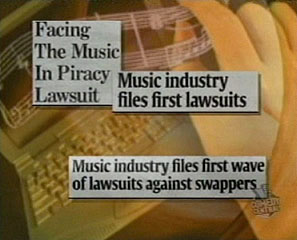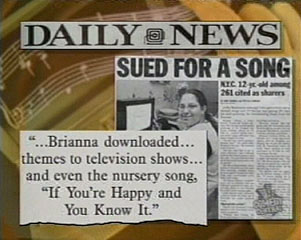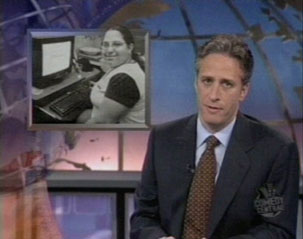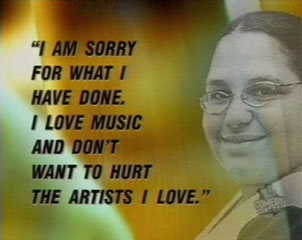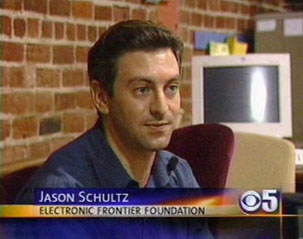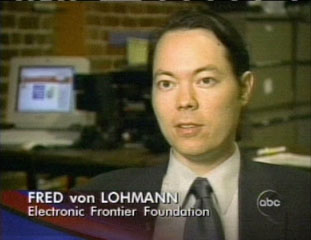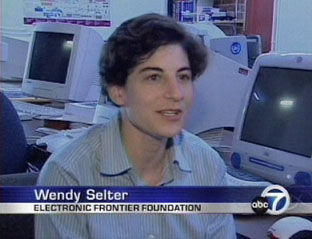Recording industry withdraws suit
Mistaken identity raises questions on legal strategy
By Chris Gaither for the Boston Globe. (Hiawatha Bray also contributed to this report.)
(Thanks, Mary.)
The recording industry has withdrawn a lawsuit against a Newbury woman because it falsely accused her of illegally sharing music — possibly the first case of mistaken identity in the battle against Internet file-traders.
Privacy advocates said the suit against Sarah Seabury Ward, a sculptor who said she has never downloaded or digitally shared a song, revealed flaws in the Recording Industry Association of America’s legal strategy. Ward was caught up in a flood of 261 lawsuits filed two weeks ago that targeted people who, through software programs like Kazaa, make copyrighted songs available for others to download over the Internet.
”When the RIAA announced they were going on this litigation crusade, we knew there was going to be someone like Sarah Ward,” said Cindy Cohn, legal director for the Electronic Frontier Foundation, an Internet privacy group in San Francisco that has advised Ward and others sued by the music industry. ”And we think were will be more.”
The lawsuit claimed that Ward had illegally shared more than 2,000 songs through Kazaa and threatened to hold her liable for up to $150,000 for each song. The plaintiffs were Sony Music, BMG, Virgin, Interscope, Atlantic, Warner Brothers, and Arista.
Among the songs she was accused of sharing: ”I’m a Thug,” by the rapper Trick Daddy.
But Ward, 66, is a ”computer neophyte” who never installed file-sharing software, let alone downloaded hard-core rap about baggy jeans and gold teeth, according to letters sent to the recording industry’s agents by her lawyer, Jeffrey Beeler.
Other defendants have blamed their children for using file-sharing software, but Ward has no children living with her, Beeler said.
Moreover, Ward uses a Macintosh computer at home. Kazaa runs only on Windows-based personal computers.
Beeler complained to the RIAA, demanding an apology and ”dismissal with prejudice” of the lawsuit, which would prohibit future lawsuits against her. Foley Hoag, the Boston firm representing the record labels, on Friday dropped the case, but without prejudice…
Evan Cox, a partner with Covington & Burling in San Francisco who is not involved with the case, said the error most likely happened in one of two ways: Either Comcast matched the wrong customer with the IP address, or the recording industry requested information about the wrong IP address, which is usually more than nine digits.
”If any of those [IP address] numbers are wrong or transposed, you’re going to get the wrong person,” Cohn said.
Whatever the source of the apparent error, it illustrates how difficult it can be to definitively match a person to an online screen name.
A Comcast spokeswoman, Sarah Eder, would not comment, citing customer privacy concerns. Comcast always notifies its customers after a subpoena compels the company to release information about them, she said.
Mistakes are likely, given the number of cases the recording industry has filed, Cox said. The industry’s reputation could hang on how many mistakes surface.
”If there turns out to be a lot of them, it will cast some doubt on [the industry’s] evidence-gathering,” he said. ”They’ll have to either strengthen their efforts or back off.”
The Electronic Frontier Foundation has counseled about 30 of the 261 people sued, Cohn said, adding that some have settled for fear of spending too much money fighting powerful corporations.
Jonathan Zittrain, an associate professor of Internet law at Harvard Law School, said the dismissal shows that the record companies may find it tough to prevail if their lawsuits go to court. Their legal strategy assumes that most defendants will settle rather than fight, and the lawsuits are so damaging to their public image that they cannot afford protracted legal battles with alleged file-swappers, he added.
”This is a very high-stakes strategy for the record companies,” he said. ”It’s either going to work in the short term, or they’re going to have to pull the plug on it.”
